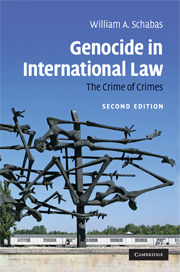Book contents
- Frontmatter
- Contents
- Preface to the first edition
- Preface to the second edition
- Acknowledgments
- List of abbreviations
- Introduction
- 1 Origins of the legal prohibition of genocide
- 2 Drafting of the Convention and subsequent normative developments
- 3 Groups protected by the Convention
- 4 The physical element or actus reus of genocide
- 5 The mental element or mens rea of genocide
- 6 ‘Other acts’ of genocide
- 7 Defences to genocide
- 8 Prosecution of genocide by international and domestic tribunals
- 9 State responsibility and the role of the International Court of Justice
- 10 Prevention of genocide
- 11 Treaty law questions and the Convention
- Conclusions
- Appendix: The three principal drafts of the Convention
- Bibliography
- Index
7 - Defences to genocide
Published online by Cambridge University Press: 07 July 2009
- Frontmatter
- Contents
- Preface to the first edition
- Preface to the second edition
- Acknowledgments
- List of abbreviations
- Introduction
- 1 Origins of the legal prohibition of genocide
- 2 Drafting of the Convention and subsequent normative developments
- 3 Groups protected by the Convention
- 4 The physical element or actus reus of genocide
- 5 The mental element or mens rea of genocide
- 6 ‘Other acts’ of genocide
- 7 Defences to genocide
- 8 Prosecution of genocide by international and domestic tribunals
- 9 State responsibility and the role of the International Court of Justice
- 10 Prevention of genocide
- 11 Treaty law questions and the Convention
- Conclusions
- Appendix: The three principal drafts of the Convention
- Bibliography
- Index
Summary
A defence is an answer to a criminal charge. It is used to denote ‘all grounds which, for one reason or another, hinder the sanctioning of an offence – despite the fact that the offence has fulfilled all definitional elements of a crime’. The law of defences is complex and, because of the special nature of the crime of genocide, some defences that may be quite significant in another context, such as consent of the victim, are of little interest here.
Sometimes different terminology is used to describe ‘defences’. For example, the Rome Statute speaks of ‘[g]rounds for excluding criminal responsibility’. There are also classifications within the general bodies of defences. The Ad Hoc Committee of the General Assembly on the International Criminal Court divided ‘defences’ into three categories: ‘Negation of liability’, including error of law, error of fact and diminished mental capacity; ‘Excuses and justifications’, including self-defence, defence of others, defence of property, necessity, lesser of evils, duress/coercion/force majeure, superior orders, and ‘law enforcement/other authority to maintain order’; and ‘Defences under public international law’, including military necessity, reprisal, and self-defence pursuant to article 51 of the Charter of the United Nations. Ultimately, however, the drafters of the Rome Statute did not attempt to classify defences in any analytical manner.
Many legal systems distinguish between ‘justification’ and ‘excuse’, although the utility of this is not necessarily apparent. As George Fletcher has explained:
Claims of justification concede that the definition of the offence is satisfied, but challenge whether the act is wrongful; claims of excuse concede the act is wrongful, but seek to avoid the attribution of the act to the author. A justification speaks to the rightness of the act; an excuse, to whether the actor is accountable for a concededly wrongful act.
- Type
- Chapter
- Information
- Genocide in International LawThe Crime of Crimes, pp. 367 - 399Publisher: Cambridge University PressPrint publication year: 2009



